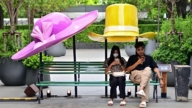Security Remains High in Xinjiang
新疆仍處於高度警戒狀態
本新聞影音出處:新唐人電視台英語新聞
【新聞關鍵字】
1. Uighurs: 維吾爾族
2. curfew: 宵禁
3. to wield clubs: 揮舞著棍棒
4. metal bars: 金屬棒
5. cleaver: n. 屠刀
6. axe: n. 斧頭
7. redress: n. 雪恥、平反、洗刷冤曲
8. vengeance: n. 復仇
Security and tension remain high in western China today, following riots in the city of Urumqi earlier this week.
在本週稍早,烏魯木齊市的暴動之後,在中國西部今天仍處於高度警戒與緊張狀態。
The violence has even forced head-of-state Hu Jintao to abandon plans to attend the G8 summit in Italy and return home to handle it. Here’s more on the situation in Xinjiang.
這場暴動已經迫使國家主席胡錦濤放棄參加在義大利舉辦的八國高峰會議,回到國內以處理這件事情。這裏有更多新疆情況的報導。
Security is high in China’s western Xinjiang region today as violence continues between ethnic Uighurs, Han Chinese, and riot police.
當暴動持續在維吾爾族、漢族、與鎮暴警察之間,在中國西部新疆地區,仍是處於高度警戒中。
Authorities imposed a curfew last night after thousands of Han Chinese stormed through the streets of the capital, Urumqi, wielding clubs, metal bars, cleavers and axes. They were demanding redress, and sometimes extracting bloody vengeance, for Sunday’s violence, which they felt involved Uighurs targeting Han people and their businesses.
當局昨天晚上實施宵禁,在數千名的漢族民眾蜂擁而至烏魯木齊的街道上,揮舞著棒子、金屬條、屠刀、斧頭等。他們要求洗刷週日的暴動中所受的冤屈,有時也用血腥報復。因為在那場暴動中,他們感到捲入了維吾爾族人針對漢人及其商業活動。
【新聞關鍵字】
1. defy: v. 藐視、違抗
2. rows of anti-riot police: 成列的鎮暴警察
3. indiscriminate arrests: 不分青紅皂白的逮捕
4. ethnic tensions: n. 種族衝突
Meanwhile, Uighurs, many of them women, also protested—defying rows of anti-riot police and telling reporters that their husbands, brothers and sons had been taken away in indiscriminate arrests.
同時,許多維吾爾族的婦女也抗議,她們無視成列的鎮暴警察,告訴記者:她們的丈夫、兄弟與兒子,已經不分青紅皂白地被捕。
There was no sign of violence Wednesday morning, but 50-year-old Li Jing says she fears protection provided by security forces was still not enough to ensure her safety.
禮拜三早上已沒有暴動的跡象,但50歲的李晴說,她害怕安全部隊所提供的保護,仍然無法確保她的安全。
[Li Jing, Urumqi Resident]:
“Of course I am worried. Urumqi is such a big place and there are so many people here now. If we just rely on the security forces, it would not be enough. People here don’t even dare to step out of their homes. What we can do now is to be on our guard. Even if I want to go out and do some exercise, I feel scared. Also we don’t have much food supplies in store at home and the supermarkets are too scared to be open for business.”
李晴說:「當然我是很擔心的,烏魯木齊是個大地方,有許多人住在這兒。如果我們只是依賴安全部隊,是不夠的。人們甚至不敢外出。我們現在所能夠做的就是自我防衛。即使我想要出去工作,做一些運動,我都會感到害怕。而且我們家中也沒有足夠的食物儲存,而超市又因為太害怕而不敢開門營業。」
5. foster: v. 培養、栽培、助長
6. call on: v. 呼籲
7. migrate: v. 移居、遷徙
Xinjiang has long been a hotbed of ethnic tensions, fostered by many factors: The Communist Party has called on Han Chinese to migrate to the region, and it’s the Han, not the locals, who end up with most of the good jobs. The CCP also tightly controls the Uighurs’ religion and culture, leaving deep-seated anger among them.
長期以來,新疆一直是種族衝突的溫床,是由多種原因所醞釀成的。中共呼籲漢民族搬遷到這一地區,但卻是漢人而非當地人,佔有了大部份的好工作。中共也緊密的控制維吾爾族的宗教與文化,也在他們之中造成了很深的憤怒。
But now the anger on both sides of the region’s ethnic divide makes controlling Xinjiang all the more difficult for the ruling communist regime.
但是現在雙方面的衝突所造成的憤怒,使得執政的共產黨政權更加困難控制新疆地區。
Mr. Jiang, a 50-year-old Urumqi resident, says that despite high security it was still unsafe to go out unarmed.
一位50歲的烏魯木齊居民張先生說,雖然有高度警戒,但是沒有武裝外出,仍然是不安全的。
[Mr. Jiang, Urumqi Resident]: “If you go to work, you will have to carry a stick or a knife. If you don’t carry anything like that, that will not work. We will have to carry something for our own safety.”
江先生說:「如果你要求工作,你必須帶一個棒子或是刀子。如果你不帶任何東西,那不行。為了我們自己的安全,我們必須帶一些東西。」
However 19-year-old ethnic Han student Zhang Chen believes that violence is not the answer.
然而,一位19歲的和51學生張盛相信:「暴力不是解決問題的方式。」
[Zhang Chen, Ethnic Han Student]:
“I think if Han Chinese are beaten up and then go out and beat other people, you cannot sympathize with them. They should use peaceful methods, not violence, to resolve the problem.”
張勝說:「我想,如果漢人被打,然後出去打其他的民族的人的話,也不會同情他們的。他們應該是用和平的方法,而不是暴力,來解決這個問題。」
8. Turkic people: n. 土耳其人
9. linguistic: adj. 語言上的
Uighurs are a Turkic people who are largely Muslim and share linguistic and cultural bonds with Central Asia. They make up just under half of Xinjiang’s 20 million people.
維吾爾人是土耳其民族的一支,大多數信仰回教,與中亞地區分享著語言與文化上的關連性。他們占了新彊兩千萬人民中的一半不到。


























